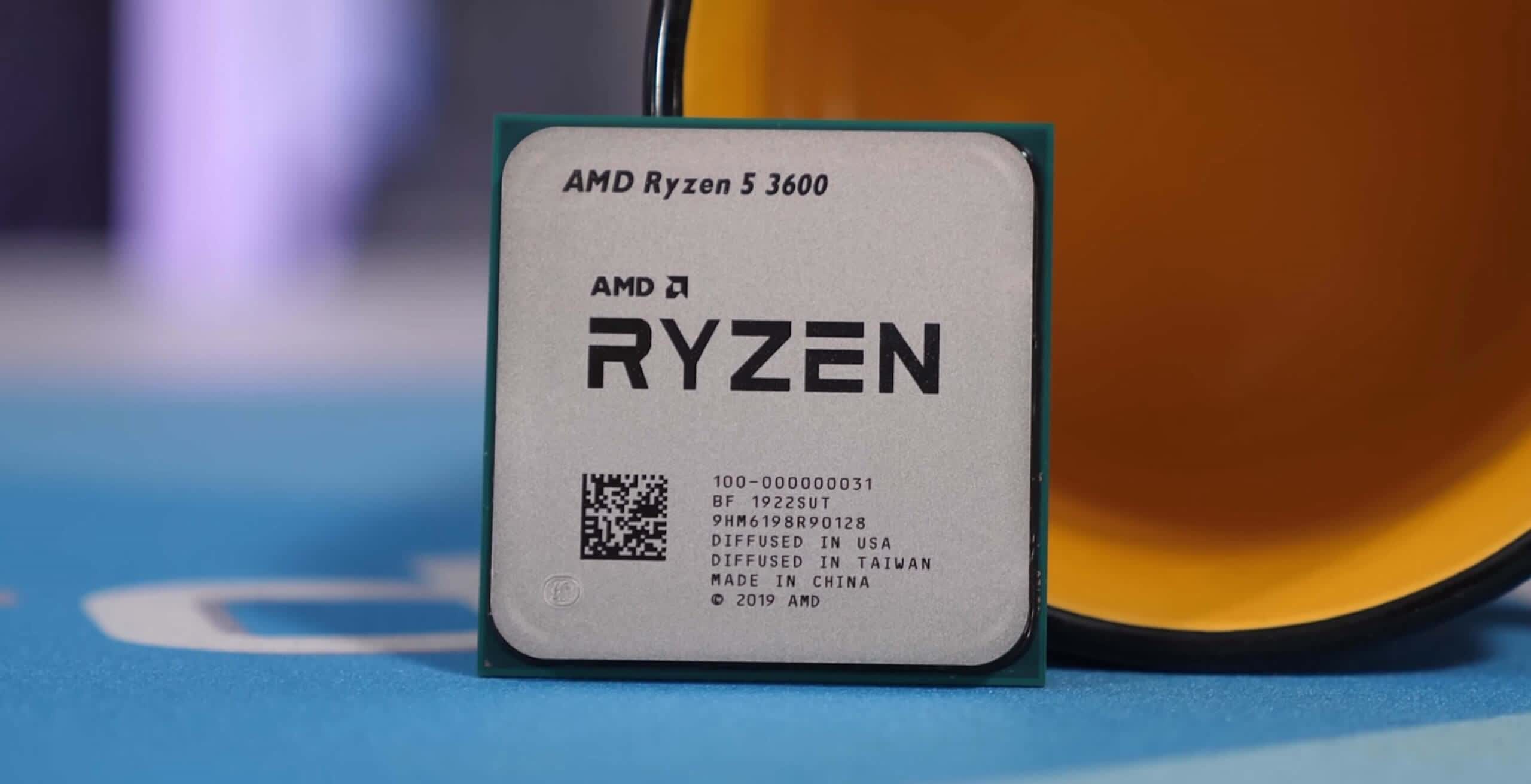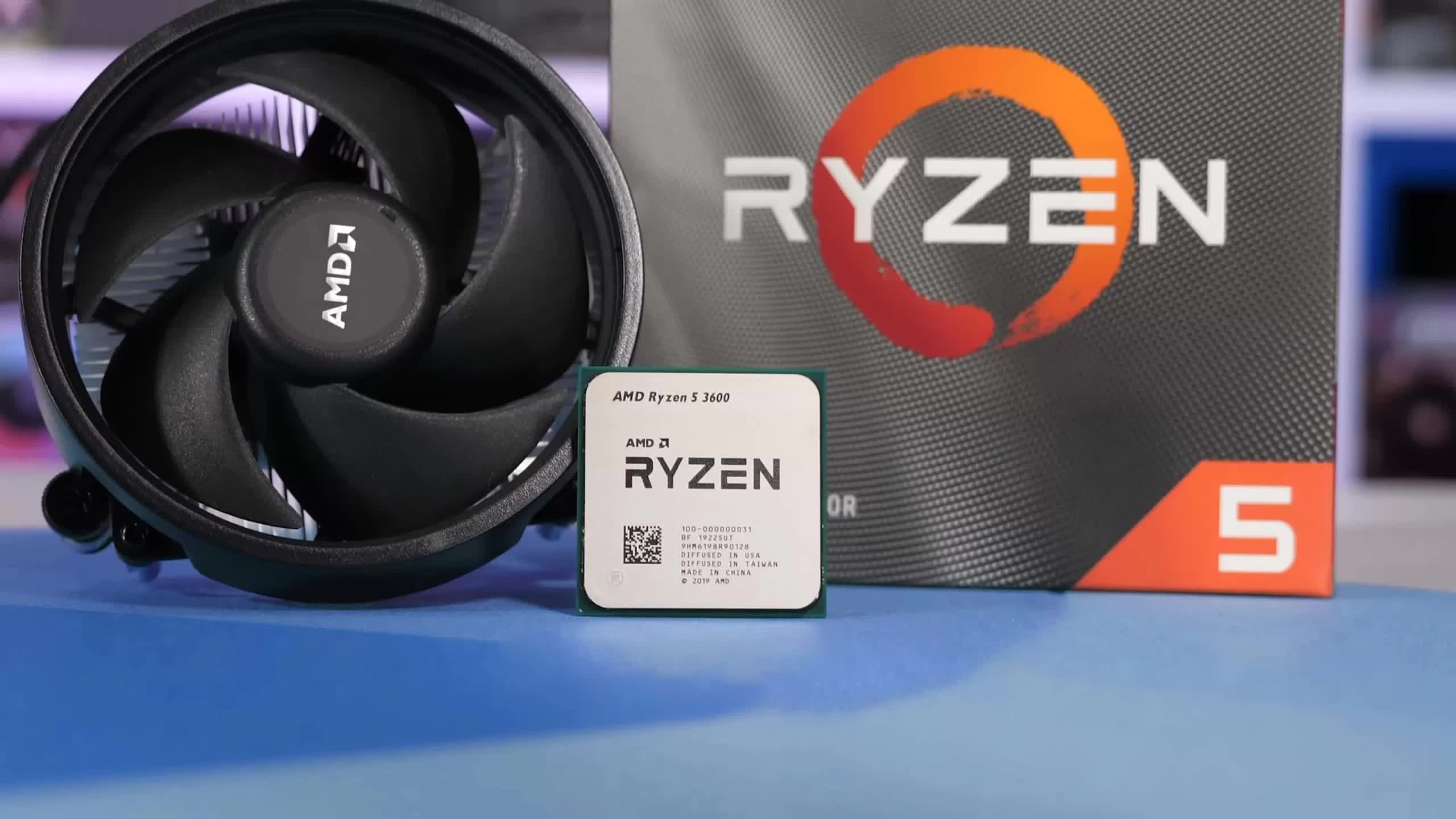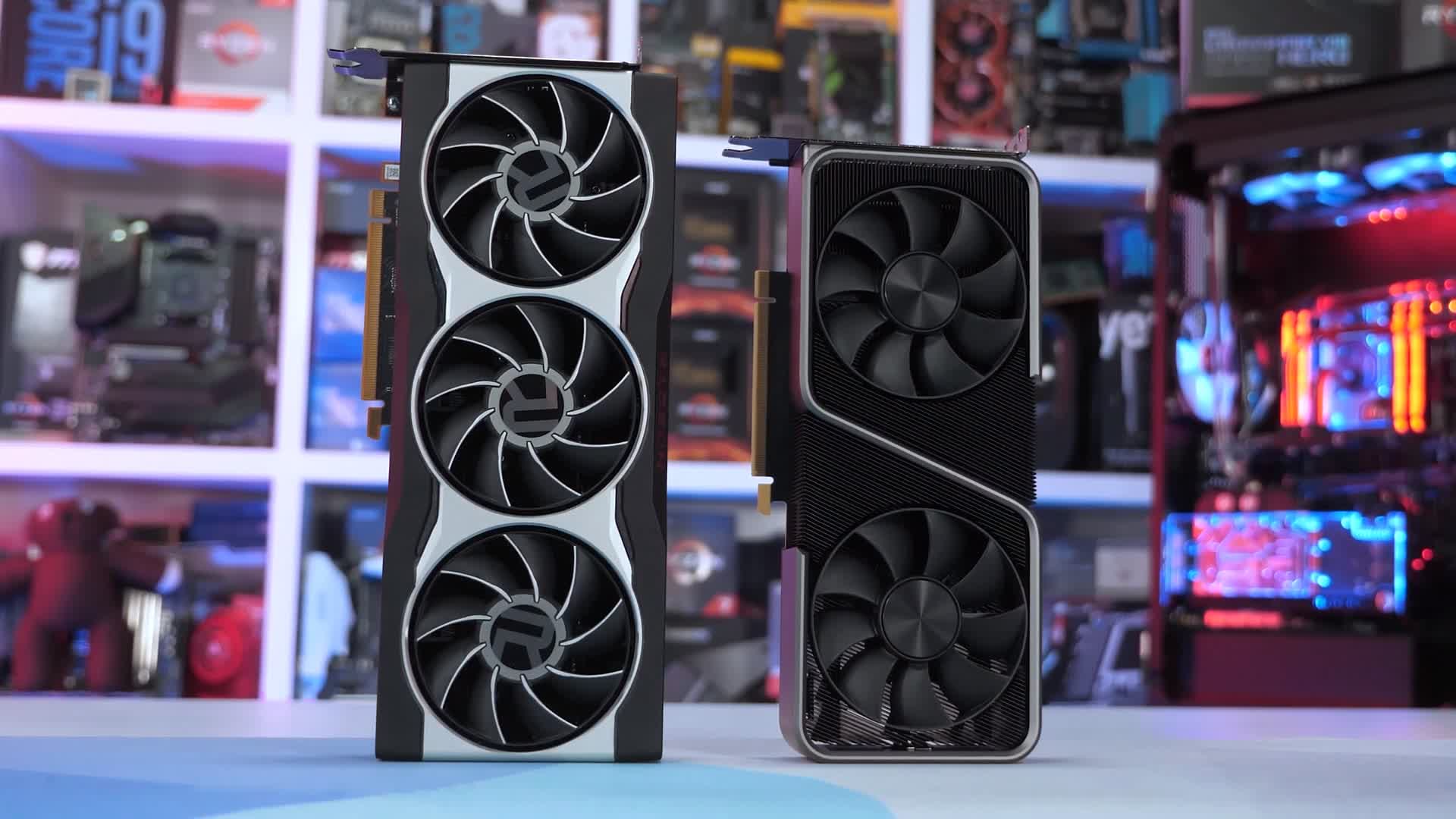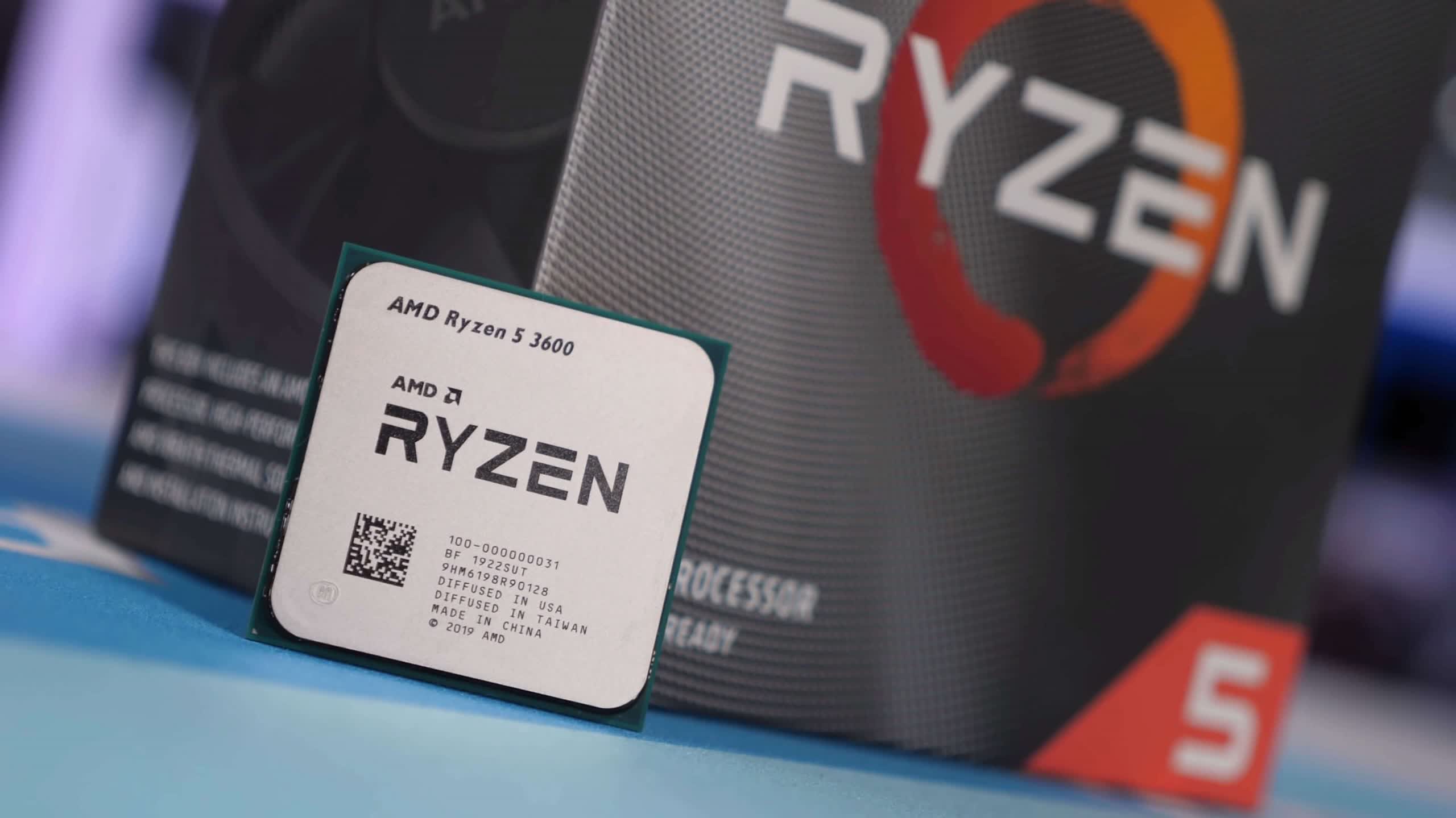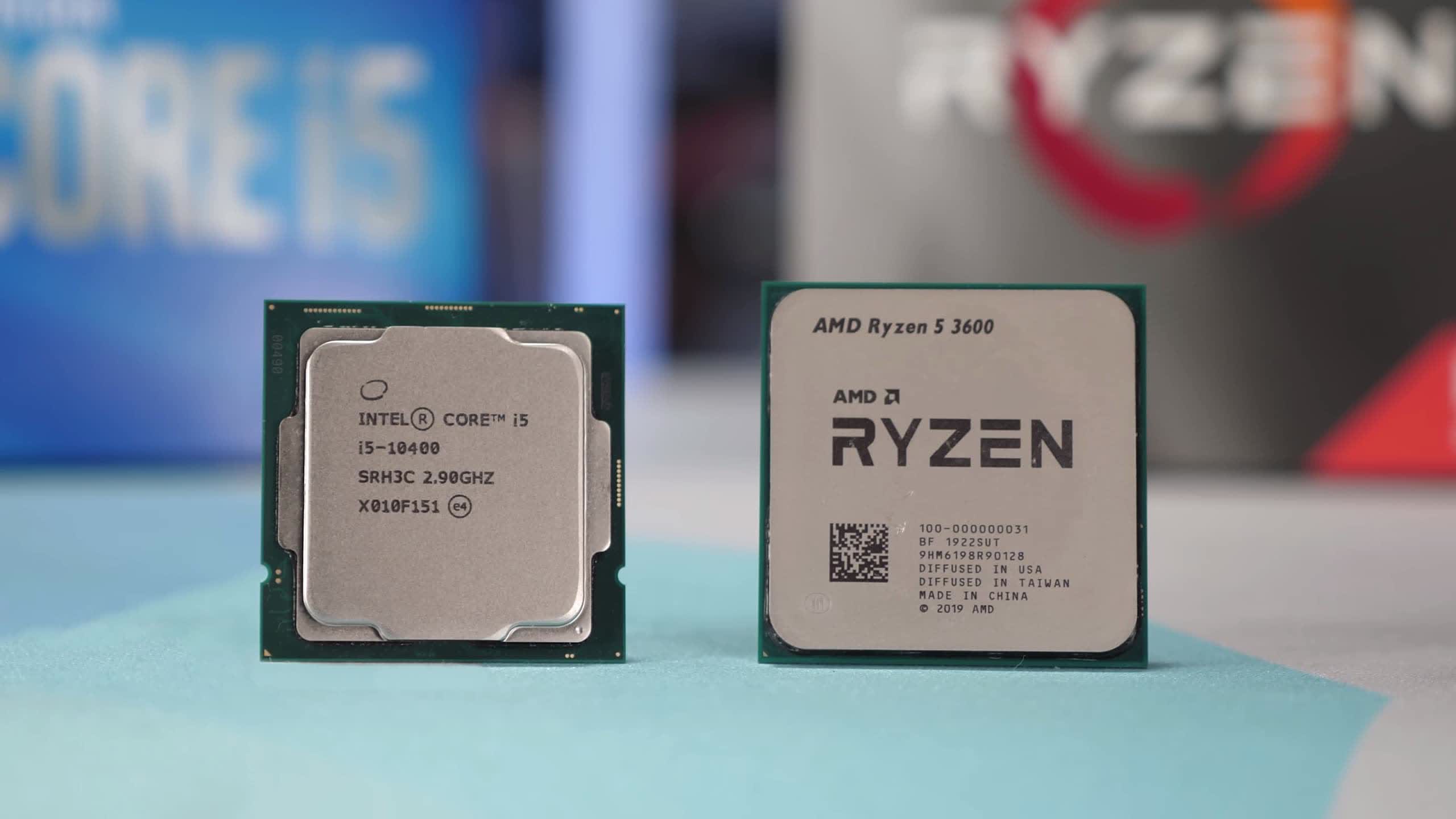Recently we took a look at how well the Ryzen 5 3600 performed in games when paired with the GeForce RTX 3080 and we did this upon readers and viewers' request. That ended up being a very popular test and since the release of the Radeon RX 6800 series we've seen just as many requests for a repeat but this time using the Radeon GPU.
Since our first test, there have also been new relevant game releases and we suspect once you can actually buy it, the RX 6800 will be a popular graphics card choice. With so many of you using the still amazing Ryzen 5 3600, it makes sense to see how it performs with the new RDNA2 GPU – though right now we feel the Intel Core i5-10400F is a better value buy, so perhaps a comparison with that part in the coming weeks might be a good idea.
For this article we're going to look at performance in 21 games at 1080p, 1440p and 4K with the R5 3600 in a stock configuration using 32GB of DDR4-3200 CL14 memory. We've not bothered to overclock the Ryzen processor this time and have instead opted to add more games.
Also please note the Ryzen 9 3950X and Core i9-10900K have been included purely as reference points and have not been overclocked either. This isn't a CPU vs. CPU content piece, rather we're just seeing how close the Ryzen 5 3600 can get to delivering $500+ CPU performance in games.
Also we didn't include a Zen 3 processor, which we deemed unnecessary as the 10900K serves the purpose of representing high-end flagship tier performance. With that, let's jump into the benchmark graphs...
Benchmarks
Starting with Godfall, we find a substantial performance difference at 1080p between the Ryzen 5 3600 and Core i9-10900K when paired with the RX 6800, here the flagship Intel processor was almost 20% faster.
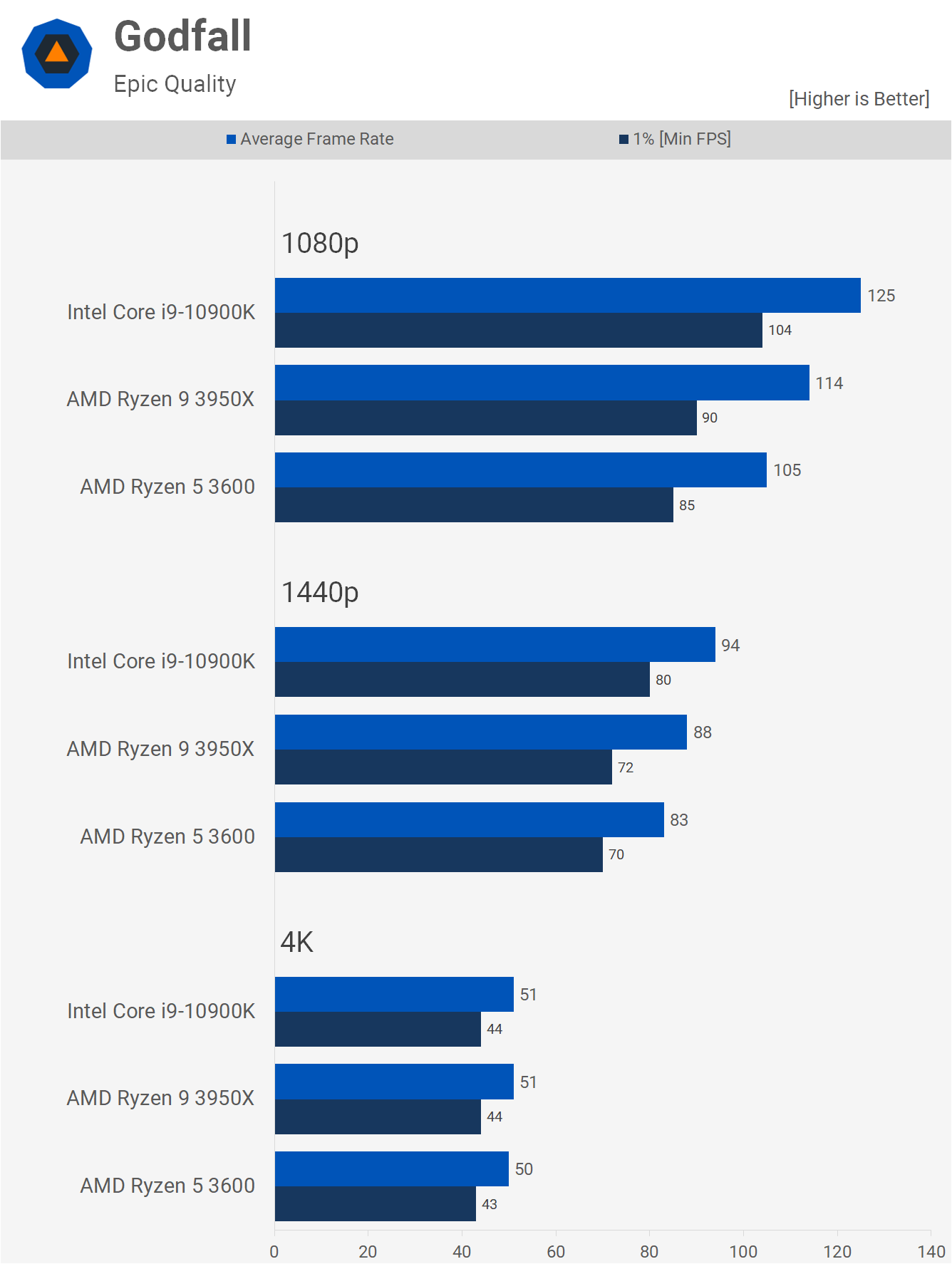
The margin is reduced to 13% at 1440p, and while you are giving up around 10 fps, the performance is still acceptable with the Ryzen 5, maintaining over 60 fps at all times. Once we jump up to 4K we're now entirely GPU limited and the CPU choice makes little to no difference.

Watch Dogs: Legion isn't a particularly CPU intensive game and as a result the R5 3600 isn't a great deal slower than the 3950X and 10900K at 1080p – we're talking about an 8% delta.
Then at 1440p, the resolution you're more likely to game at with an RX 6800, the Ryzen 5 processor is able to get the most out of the new Radeon GPU, and of course, the same also applies at 4K.
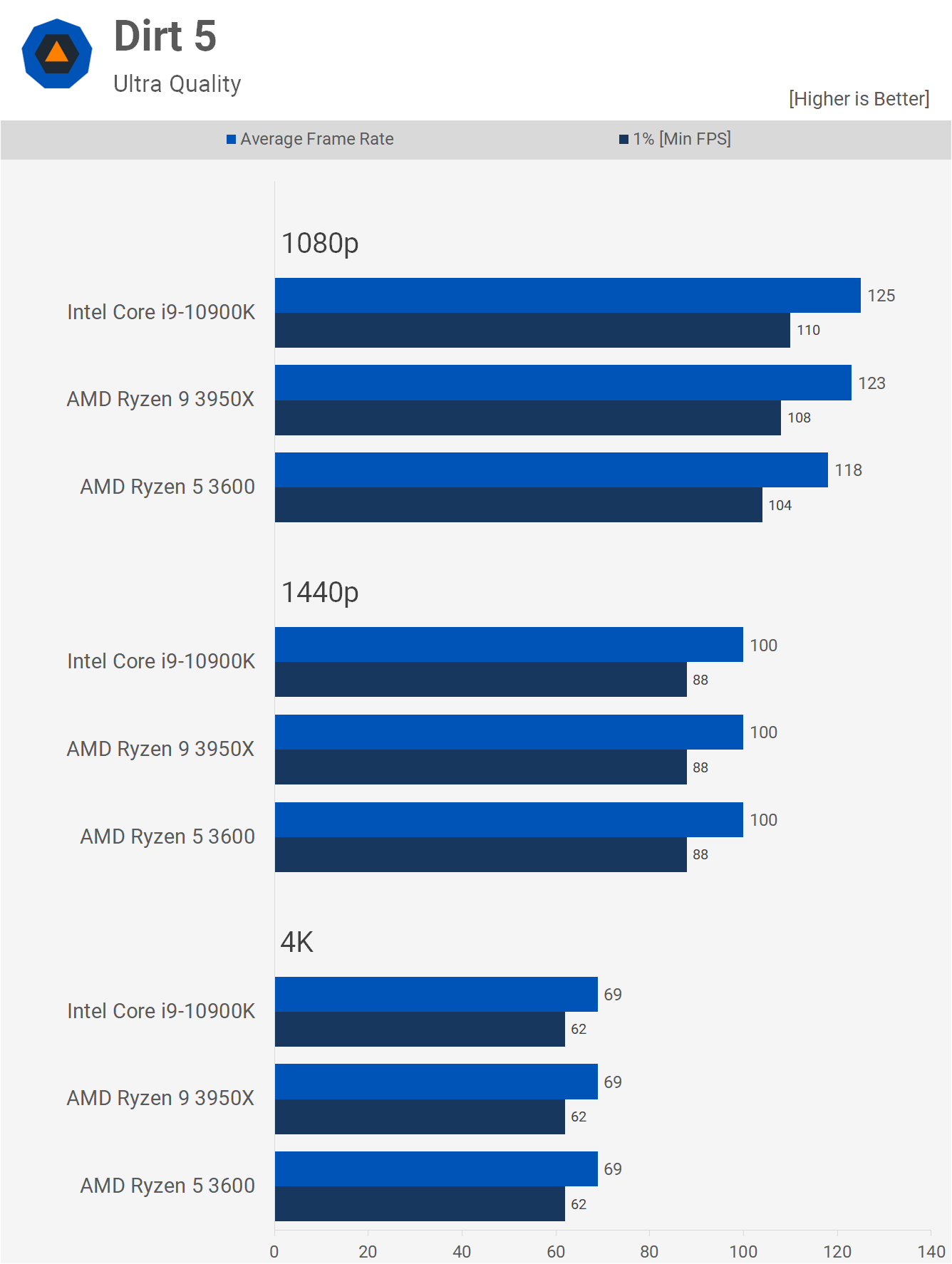
Another game that won't stress the Ryzen 5 processor is Dirt 5, here the 3600 was 6% slower than the 10900K at 1080p, while it matched it at 1440p and 4K. So we're getting the most out of the RX 6800 in this title.
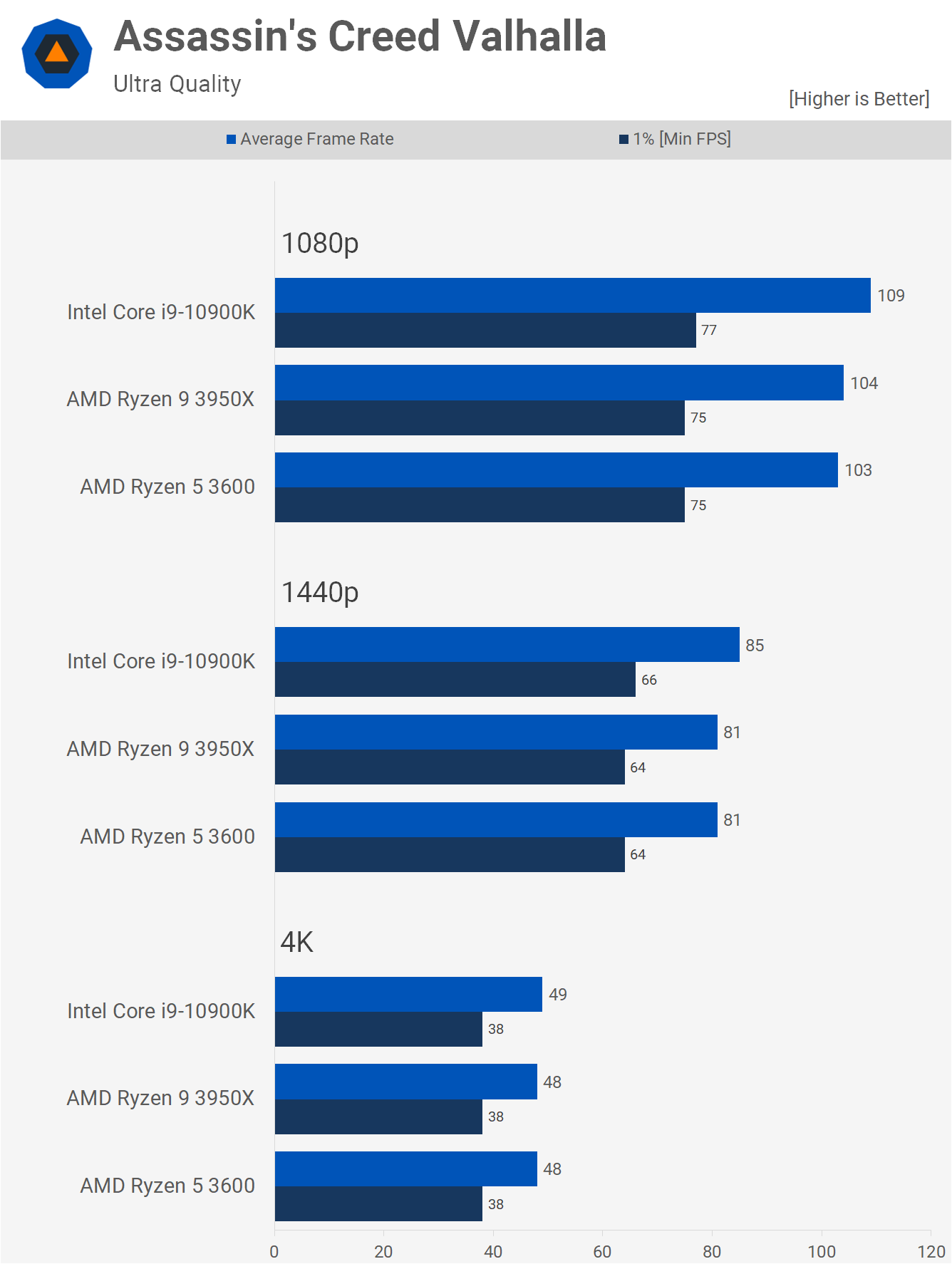
The R5 3600 also performed well in Assassin's Creed Valhalla, matching the 3950X at all three tested resolutions while only trailing the 10900K by a 6% margin at 1080p.
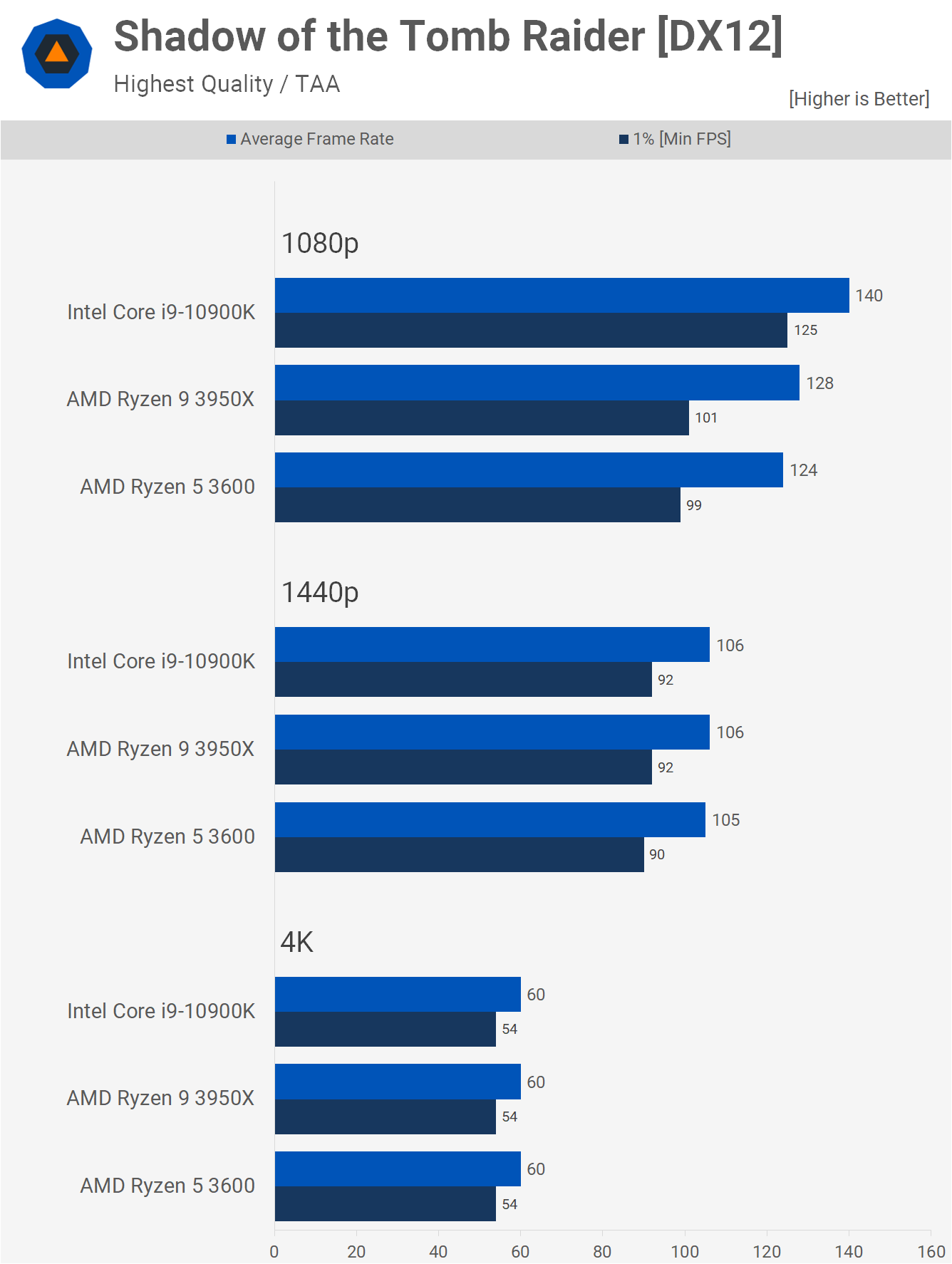
For testing Shadow of the Tomb Raider we're not using the built-in benchmark as we find actual gameplay to be more CPU demanding, particularly where we test. The R5 3600 was 11% slower than the 10900K at 1080p, though despite that we're entirely GPU limited at 1440p, and then of course 4K.
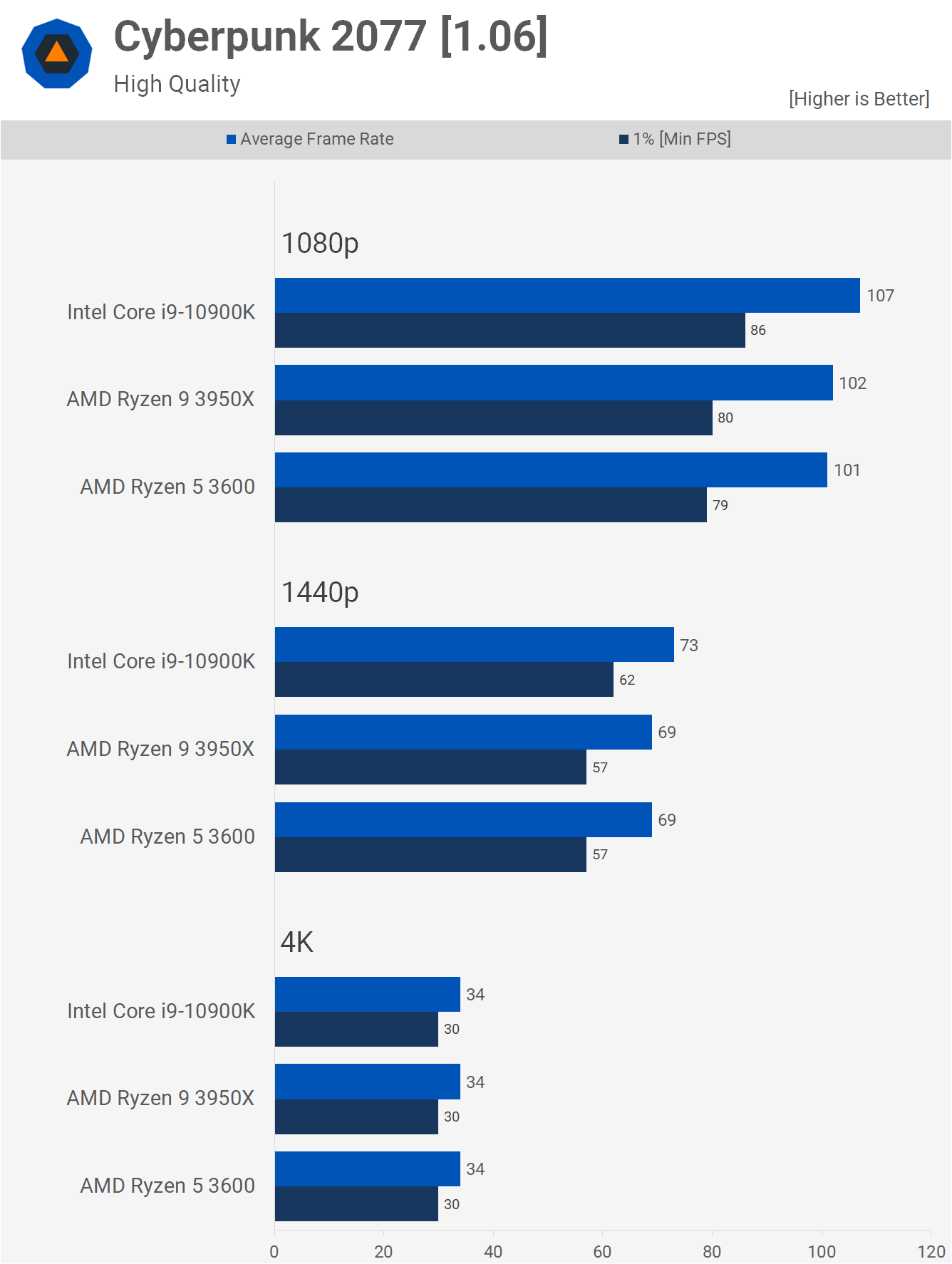
Using the latest version of Cyberpunk 2077 (1.06 as of this test) we find that performance with the Ryzen 5 3600 is excellent, matching the 3950X at all three tested resolutions. In fact, the 3600 was a mere 6% slower than the 10900K at 1080p with the RX 6800, so a very impressive result in this new and very demanding title.

The Ryzen 5 processor was blistering fast in Tom Clancy's Rainbow Six Siege, allowing for over 400 fps at 1080p and that meant it was just 7% slower than the 10900K. That said, at 1440p it matched the Core i9 processor and as a result we're also looking at identical performance at 4K.
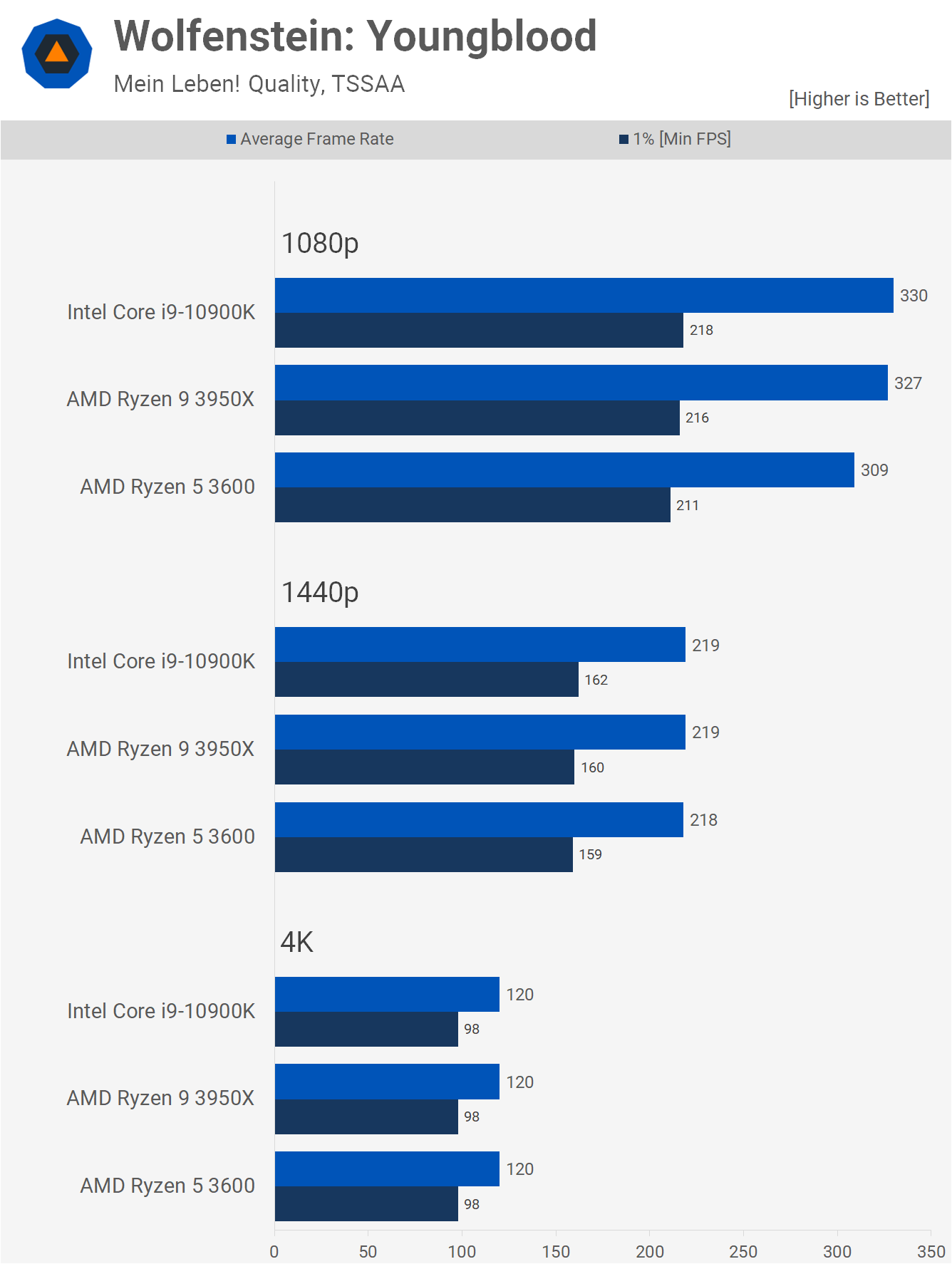
Wolfenstein: Youngblood like most games isn't CPU limited when using modern 6-core/12-thread processors like the R5 3600. Therefore we're seeing comparable performance between the 3600, 3950X and 10900K.

We're only looking at a very minor performance decline in F1 2020 with the Ryzen 5, at 1080p it was 8% slower than the 10900K, 6% slower at 1440p with little to no difference at 4K. So while slower at 1080p and 1440p, we're talking about single digit percentages differences that you're very unlikely to notice.

We're also looking at an 8% performance decline at 1080p and 1440p in Horizon Zero Dawn when comparing the Ryzen 5 3600 to the 10900K. It's not until we reach 4K that the game becomes almost entirely GPU bound.
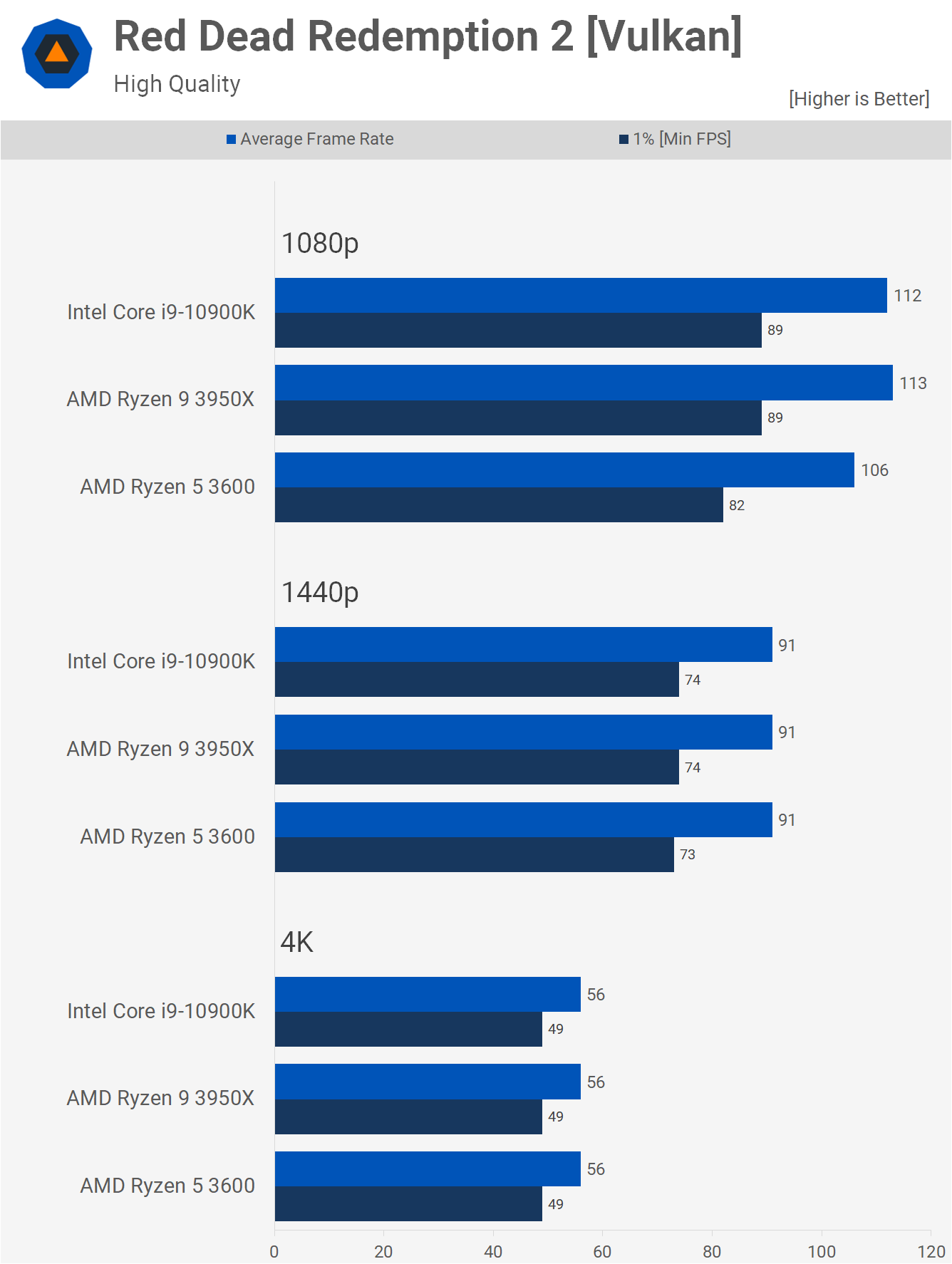
Like Shadow of the Tomb Raider, we're testing Red Dead Redemption 2 in game rather than using the built-in benchmark. The R5 3600 was just 5% slower than the 10900K at 1080p but was able to match it at 1440p and 4K.
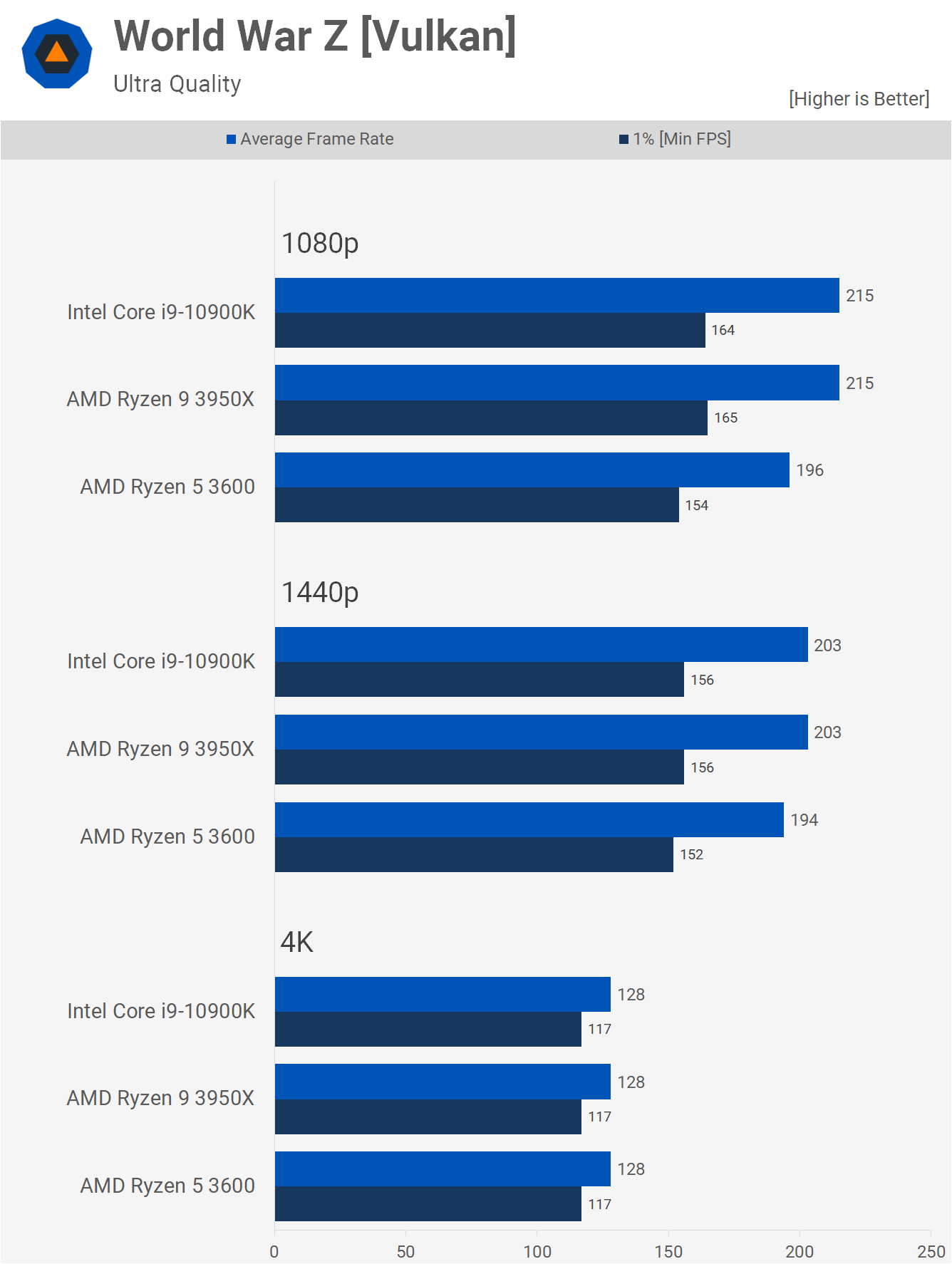
Testing with World War Z saw the Ryzen 5 processor trailing by a 9% margin at 1080p when compared to the 3950X and 10900K – we're talking about nearly 200 fps where the margin is less important though. That's reduced to 4% at 1440p and by the time we hit 4K all three CPUs will deliver an identical experience.
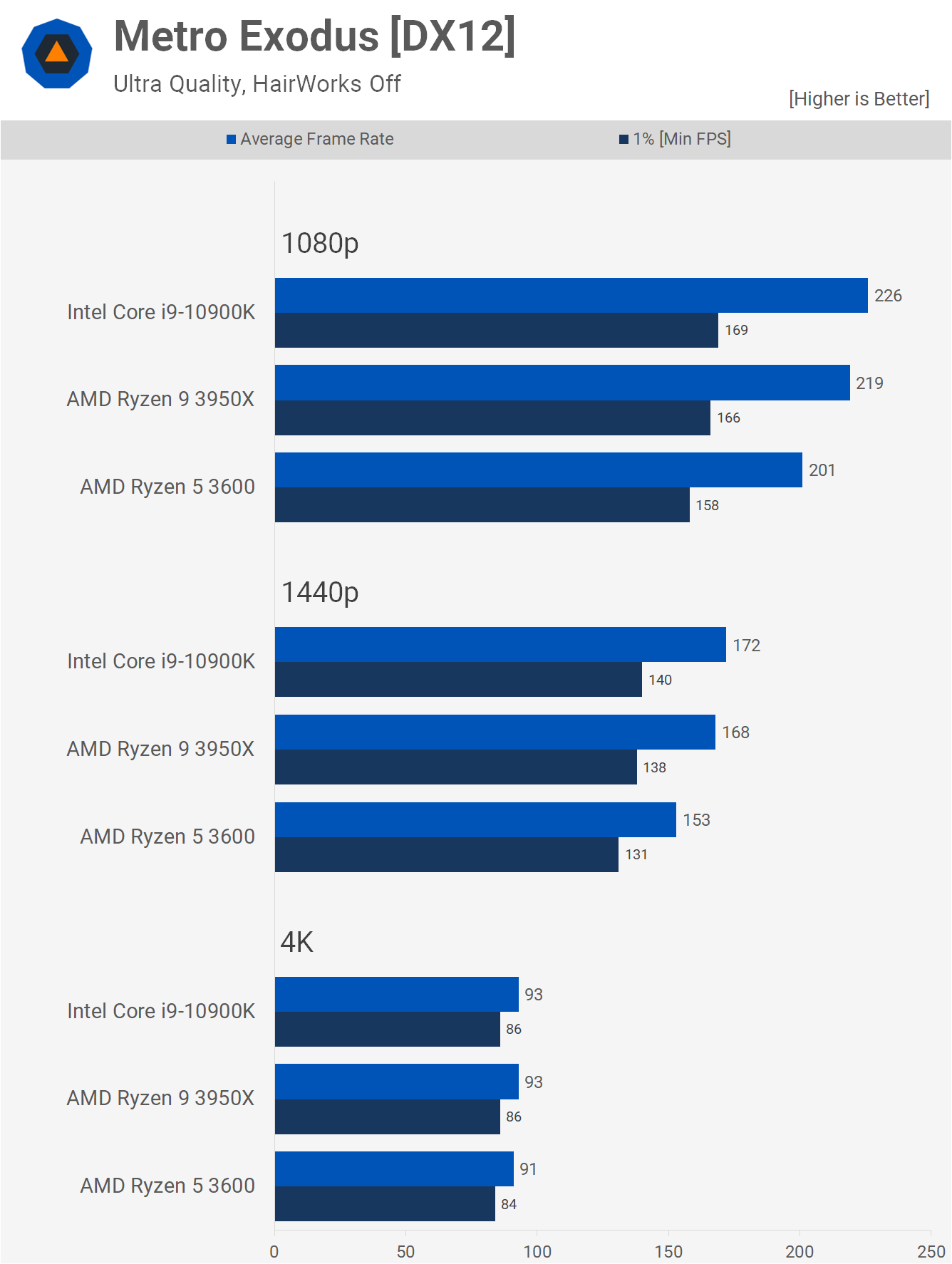
The 3600 was 11% slower than the 10900K in Metro Exodus at 1080p and 1440p, though in the case of the 1080p results we're again still talking about 200 fps on average with the Ryzen 5 processor.
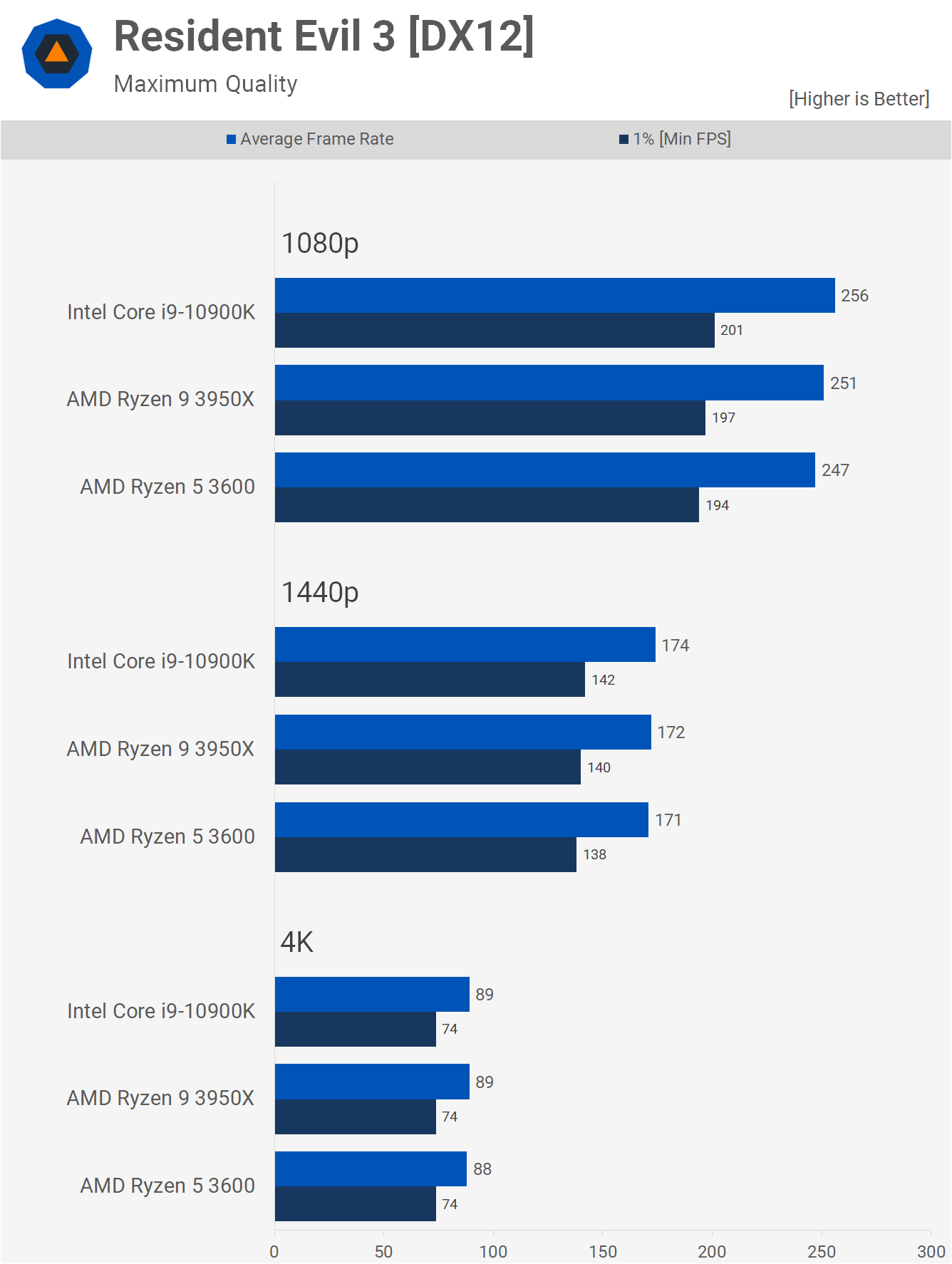
Resident Evil 3 isn't at all CPU demanding and as a result when using the RX 6800 we see no difference in performance between the three CPUs tested, even at 1080p.
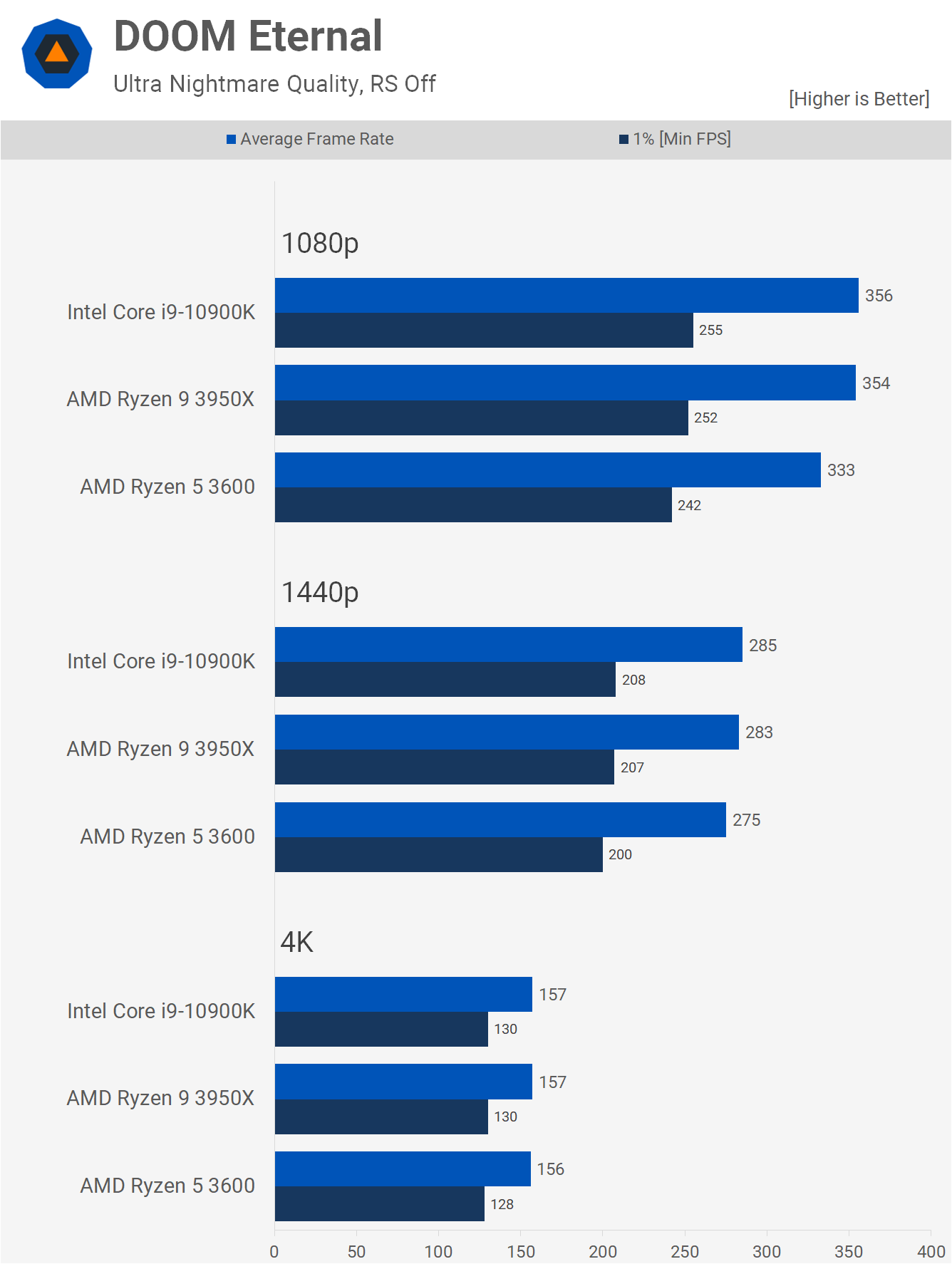
Doom Eternal is yet another game that's more GPU bound, though at 1080p the R5 3600 was 6% slower than the 10900K, at 1440p performance is the same and then we're looking at identical frames at 4K.

Moving on to Death Stranding, here we have a game that is CPU intensive and when it comes to the Zen 2 architecture it can and will take advantage of more than 6 cores.
It's rare in today's games that you'll see the 3950X delivering nearly 30% more performance, but that's what we got at 1080p. The R5 3600 was still providing smooth gameplay with well over 100 fps nonetheless.
Increasing the resolution to 1440p reduces the CPU bottleneck with the R5 3600 as we become more GPU bound, so the Ryzen 5 processor was about 10% slower than the flagship parts when comparing 1% low performance.
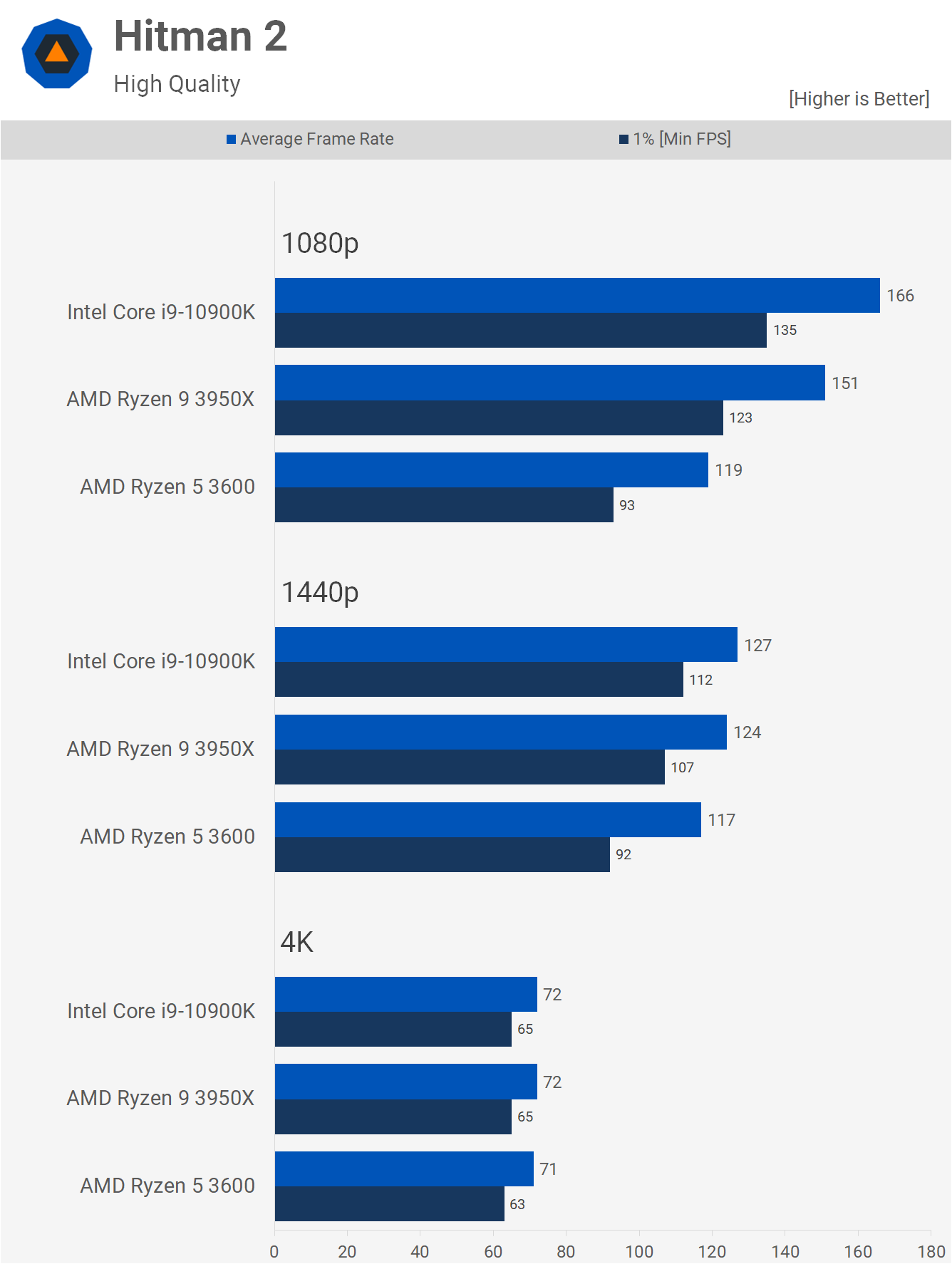
Hitman 2 behaves a lot like Death Stranding. We're looking at a 27% performance boost from the R5 3600 to the 3950X at 1080p, while the 10900K is almost 40% faster. However, at 1440p those margins are drastically reduced as the game requires more GPU power, so now the 10900K is just 9% faster than the 3600 and at 4K we see no difference at all.

Testing with War Thunder sees no performance difference between these three CPUs, so the Ryzen 5 3600 is able to get the most out of the Radeon RX 6800, even at 1080p.

The R5 3600 performs quite well in The Witcher 3, trailing the 10900K by just 8% at 1080p and 1440p. At 1440p we're looking at 100+ fps at all times.
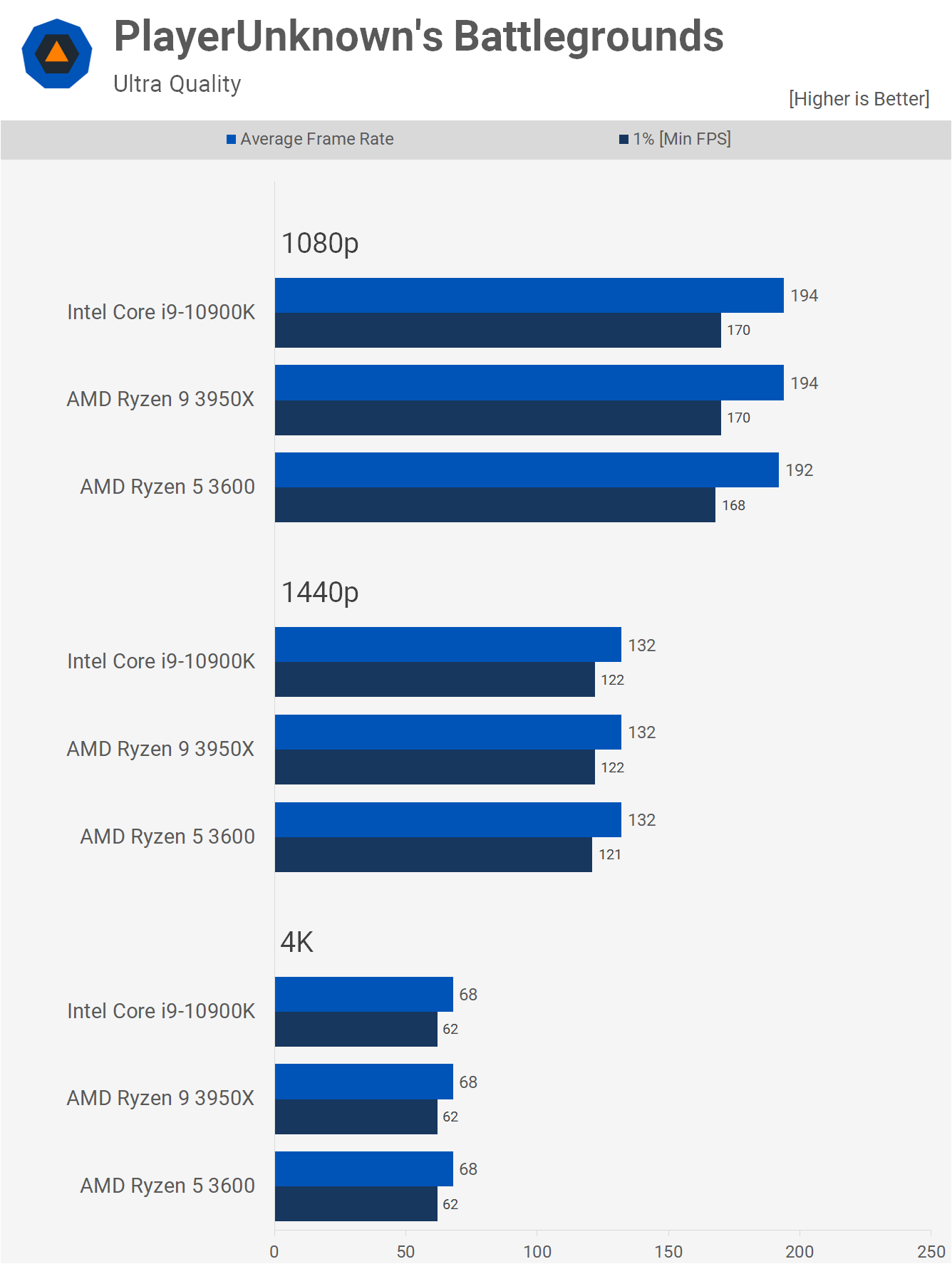
PUBG now plays a lot better on Zen 2 processors. Here we see the R5 3600 matching the 10900K at all tested resolutions.
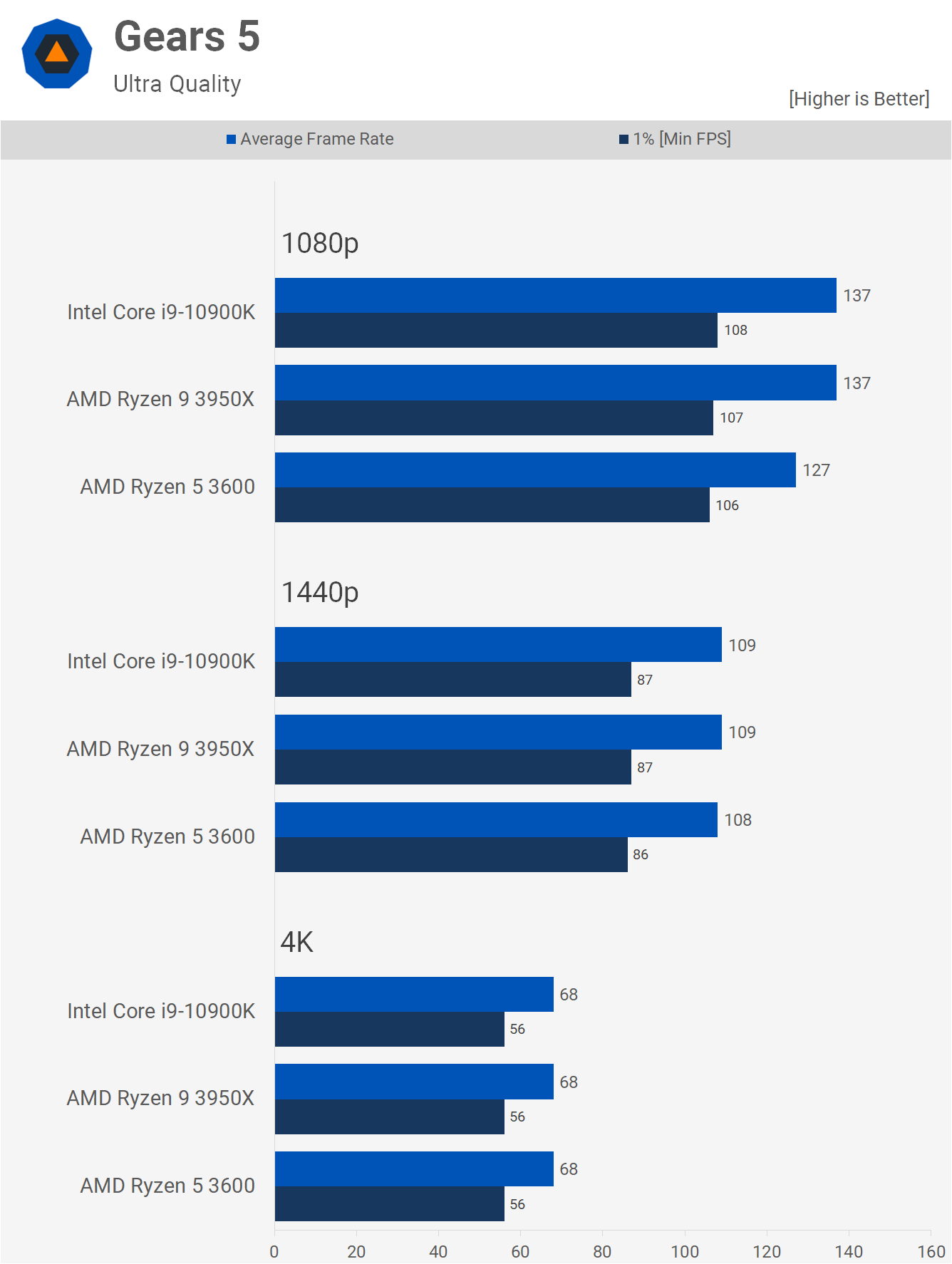
Finally we have Gears 5 results, where the 3600 only dropped a few frames at 1080p and was able to match the flagship processors at 1440p and 4K. A great result overall for the plucky little 6-core Zen 2 processor.
Performance Summary
That's all 21 games and we have to say, it looks like the Ryzen 5 3600 fared really well, often not leaving a great deal of performance on the table at 1440p and nothing at 4K. The 1080p data we feel is more for science than it is practical use case but obviously for those seeking maximum performance at 1080p the R5 3600 isn't always ideal.
Let's take a look at the average fps data cross our 21 game sample.
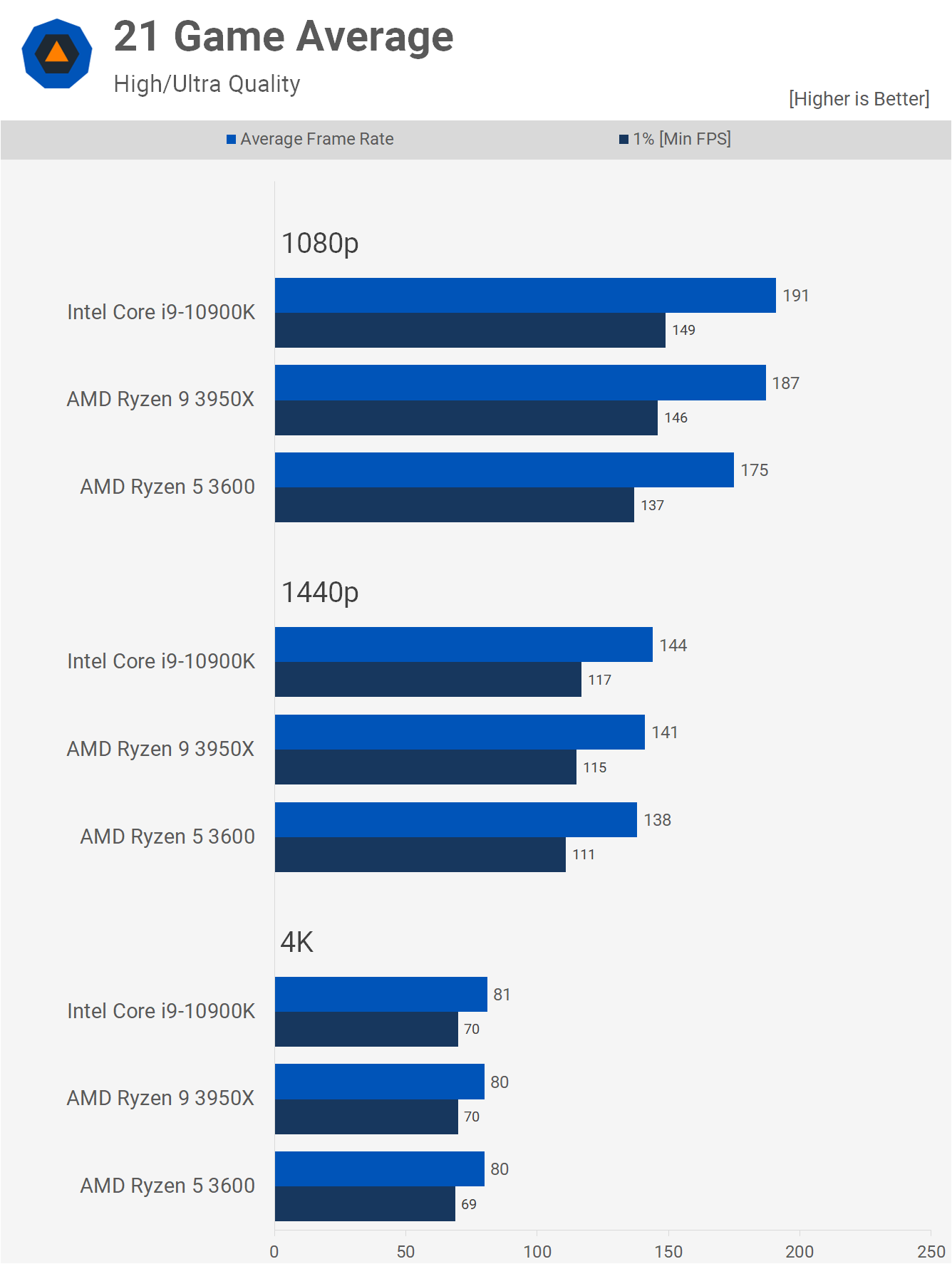
Looking at averages we see that at 1080p the Ryzen 5 3600 is 8% slower than the Core i9-10900K and just 6% slower than the Ryzen 9 3950X. So you won't always be able to get the most out of the RX 6800 with the Ryzen 5 processor, but for most of you it's so close it won't warrant a CPU upgrade.
Then if you're gaming at 1440p, it's rare when you will notice the R5 3600 performing any slower than even the 10900K, here it was just 4% slower on average. If you're gaming at 4K or any resolution greater than 2560x1440, the CPU won't really matter, as long as it's equal to or faster than the 3600.
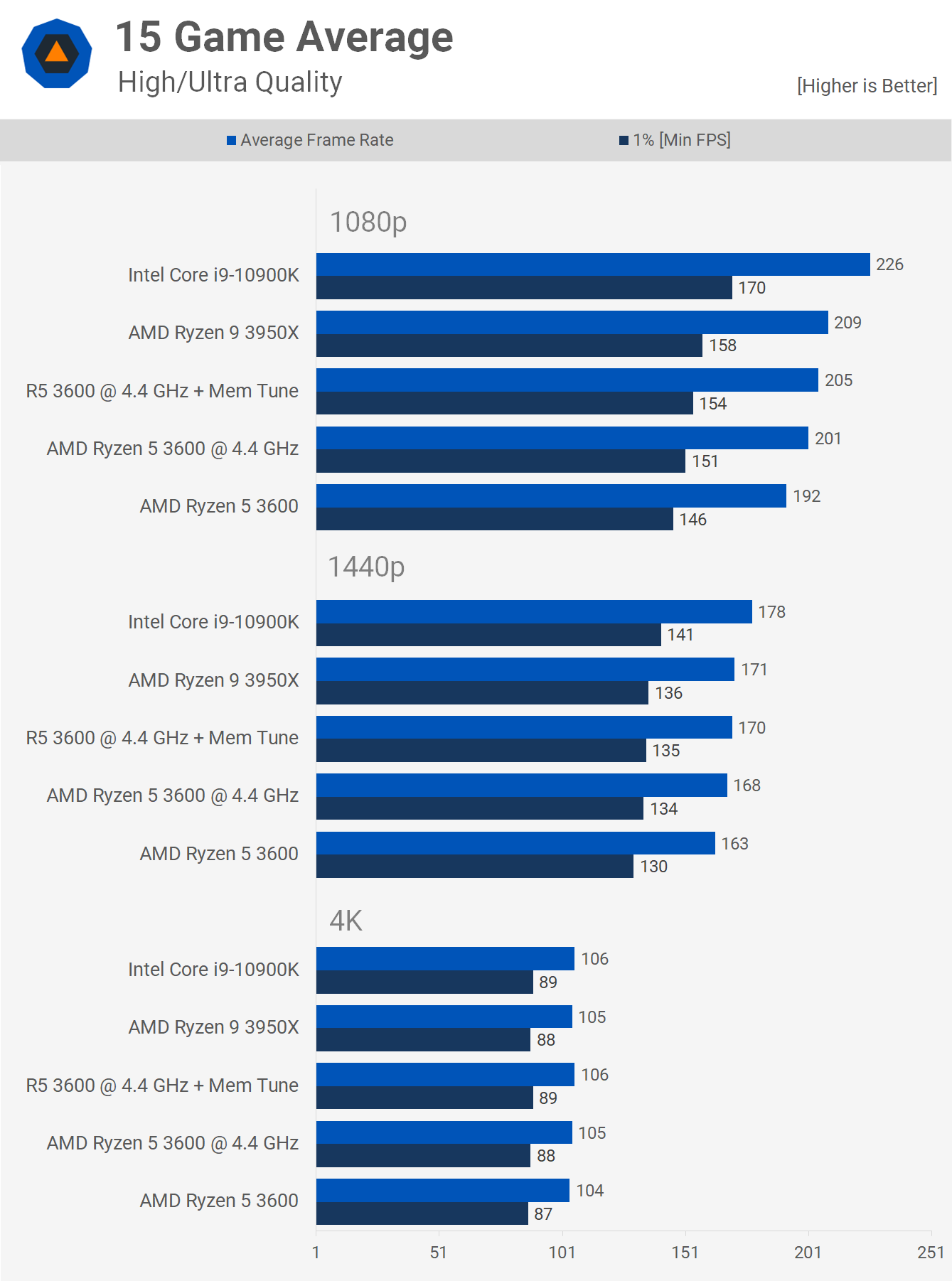
Out of interest, here's a look back at how the 3600, 3950X and 10900K compared in a 15 game sample with the GeForce RTX 3080. Here the R5 3600 was 15% slower than the 10900K at 1080p and 8% slower at 1440p. So worse than the margins seen with the RX 6800, though this can be due to a number of factors such as the games used and driver overhead.
What We Learned
Those of you using a Ryzen 5 3600 who might be concerned about needing to replace your CPU when upgrading to a Radeon RX 6800, we think for most the answer is simple: stick with the Zen 2 processor for now. The upgrade to a 5800X or better, which should see comparable performance to what was just seen with the 10900K, won't be worth the investment for gaming.
For now you can still get away with a 6-core/12-thread Zen 2 processor, unless you're doing something more demanding on the side, like streaming, for example. Spending $450 on the 5800X just isn't going to be worth it, and even if a $200-ish Ryzen 5 5600 existed, we're not sure it'd be worth the upgrade either.
That covers it for those of you already rocking a Ryzen 5 3600, but what about people looking to upgrade from something much older, or are perhaps building an entirely new PC, what CPU should you be looking at right now?
Arguably, right now is not a great time to upgrade or build a new PC. The Ryzen 5 3600 is back to around $200 at most retailers even though it sold closer to $160 last year. We're seeing the same scenario with all Zen 2 processors. For example, the 3700X was listed for $260 back in July and now it's $320.
As we mentioned earlier, the Core i5-10400F is a pretty great deal at the moment, however. It's selling for around $166 which is almost 20% less than the R5 3600. Meanwhile, you're looking at ~$300 for the 5600X which is an ugly price for that part, hell you can snap up a 10600K for $270.
Frankly, if we were forced into buying a great value gaming CPU right now, we'd go Intel with the 10400F. While those of you who managed to snap up a Ryzen 5 3600 when they were selling well below the MSRP, you've done well, very well indeed.
